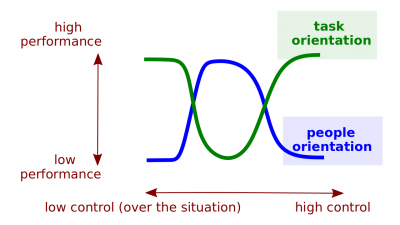Difference between revisions of "Least preferred coworker questionnaire"
(Created page with "The least preferred coworker questionnaire ( (hereinafter, the ''Questionnaire'') is an instrument that purports to measure whether a person is task or relationship orient...") |
|||
| Line 1: | Line 1: | ||
| − | + | [[Least preferred coworker questionnaire]] (hereinafter, the ''Questionnaire'') is an instrument that purports to measure whether a person is task or relationship oriented. The ''questionnaire'' has initially been developed for the [[Fiedler contingency model]]. | |
| + | |||
| + | ==Definitions== | ||
| + | According to [[Organizational Behavior by Robbins and Judge (17th edition)]], | ||
| + | :[[Least preferred coworker questionnaire]]. An instrument that purports to measure whether a person is task or relationship oriented. | ||
==Contingency model== | ==Contingency model== | ||
Revision as of 05:11, 26 November 2018
Least preferred coworker questionnaire (hereinafter, the Questionnaire) is an instrument that purports to measure whether a person is task or relationship oriented. The questionnaire has initially been developed for the Fiedler contingency model.
Definitions
According to Organizational Behavior by Robbins and Judge (17th edition),
- Least preferred coworker questionnaire. An instrument that purports to measure whether a person is task or relationship oriented.
Contingency model
Fiedler contingency model. A model that suggests that effective group performance depends on the proper match between a leader's orientation, whether he or she is task-oriented or people-oriented, and the degree to which the situation allows the leader to control and influence. The model (1) uses a least preferred coworker questionnaire to classify leaders, (2) assumes that leaders cannot be both task-oriented or people-oriented, and (3) suggests that people orientation is the best match to the situations with moderate control, while those leaders who are task-oriented best perform in situations with high or low control.
